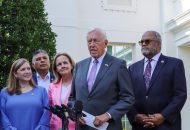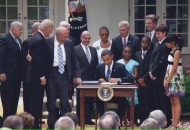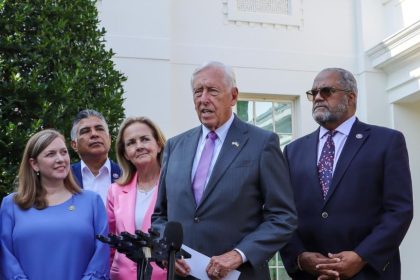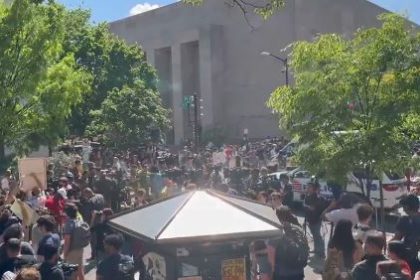When One Person Uses a Ride-Hailing App, all of Society Pays
The traffic impact of swapping personal vehicle travel for an app-based trip is an order of magnitude greater than the emissions impact
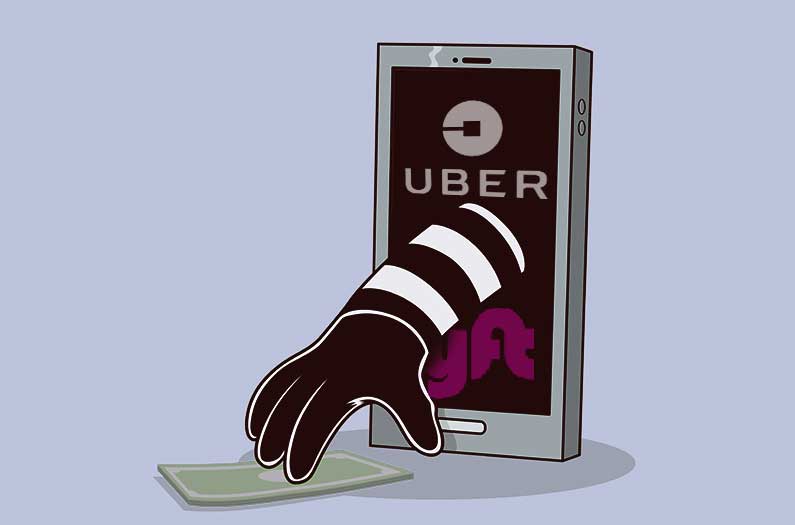
This article is by Sarah DeWeerdt and was originally published by Anthropocene magazine.
A car trip made via ride-hailing app such as Uber or Lyft has external costs that are 30-35% higher than a comparable trip made via a personal vehicle, according to a new study. The ride-hailing app trip has hidden costs to society to the tune of 32-37 cents more, on average, from the impact of pollution and traffic.
The external costs of ride-hailing trips are greater even if the ride-hailing fleet is fully electric, researchers found – a result that highlights how the impact of cars on society doesn’t just come from greenhouse gas emissions.
Researchers from Carnegie Mellon University in Pittsburgh, Pennsylvania analyzed the impacts of replacing personal vehicle travel with app-based trips in 6 U.S. cities: Austin, Texas; Boston, Massachusetts; Chicago, Illinois; Miami, Florida; Philadelphia, Pennsylvania; and San Francisco, California.
They calculated the external costs of 100,000 simulated trips made by each mode of travel. External costs are society-wide impacts that aren’t well accounted for by market prices: in this case, air pollution, greenhouse gas emissions, road congestion, car crashes, and traffic noise.
App-based trips reduce traditional air pollutants (things like sulfur dioxide, nitrogen oxides, and tiny particles that can damage the lungs) by 50-60% compared to personal vehicle trips, the researchers report in the journal Environmental Science & Technology. This is partly because vehicles used by app drivers are newer and less polluting than average. It’s also because cars produce more pollution and run less efficiently after sitting for 12 hours or more, and app-based travel involves fewer of these ‘cold starts.’
But these benefits are more than canceled out by ‘deadheading,’ which is when an Uber or Lyft driver travels from one drop-off to the next pickup, or simply drives around waiting for their next fare to be assigned. Essentially, getting a person from point A to point B results in more vehicle miles driven for an app-based trip than it does for a personal vehicle trip.
The impact of deadheading amounts to a 20% increase in fuel consumption and greenhouse gas emissions and a 60% increase in external costs from traffic (congestion, crashes, and noise) for app-based trips compared to personal vehicle trips.
Overall, app-based travel is associated with 30-35% greater external costs compared to personal vehicle travel. App-based travel reduces the external costs of air pollution by an average of 9-13 cents per trip and increases the external costs of traffic and carbon emissions by 45 cents per trip, which nets out to an increase of 32-37 cents more per trip.
The picture, of course, is even worse when app-based trips substitute for trips made by public transit, biking or walking: in this case the increase in external costs is three times greater, or $1.20 per trip on average.
But what about the fact that when you take an Uber or Lyft you don’t have to drive around searching for parking at your destination? For the average trip, the benefit of app-based travel in this dimension only amounts to about 5 cents in avoided external costs. Even if it’s really, really hard to find parking, taking an app-based trip instead of driving your own car basically amounts to a wash.
The results lay bare just how heavy a toll the external costs of traffic impose on society: The traffic impact of swapping personal vehicle travel for an app-based trip is an order of magnitude greater than the emissions impact.
Even if the entire app-based fleet were electric and powered by a zero-emission grid, “the external benefits of eliminating air pollutant and [greenhouse gas] emission externalities are not large enough to overcome the external costs from deadheading travel externalities,” the researchers write. In that scenario, app-based travel is still associated with external costs of 25 cents more per trip than personal vehicle travel.
The only thing that can make a difference is carpooling. When an app-based trip replaces *two* personal vehicle trips, this reduces overall external costs by 60 cents per trip on average.
Taxes and other public policy approaches could help hold down the external costs of app-based travel, the researchers suggest, for example by encouraging ride-pooling through Uber and Lyft, encouraging app-based travel to destinations where parking is in especially short supply, and discouraging it on routes that are already well served by public transit.
Anthropocene magazine, published by Future Earth, gathers the worlds’ best minds to explore how we might create a Human Age that we actually want to live in.
Sarah DeWeerdt is a Seattle-based freelance science journalist specializing in biology, medicine, and the environment. In addition to Anthropocene, her work has appeared in Nature, Newsweek, Nautilus, Spectrum, and many other publications. Find her on Twitter at @DeWeerdt_Sarah.
Source: Ward J.W. et al. “Air Pollution, Greenhouse Gas, and Traffic Externality Benefits and Costs of Shifting Private Vehicle Travel to Ridesourcing Services.” Environmental Science & Technology 2021.









